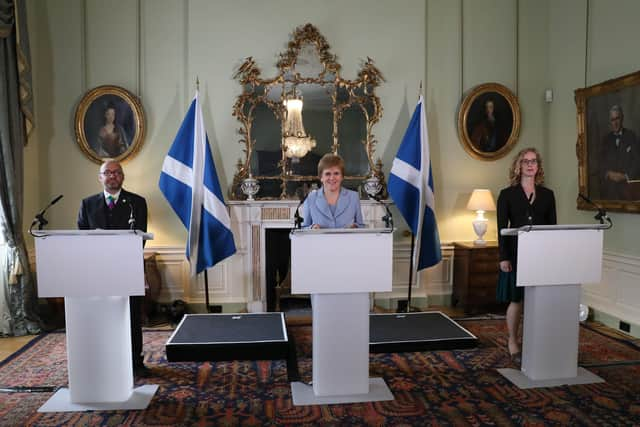SNP-Green deal has risks for both parties but moves climate change up the agenda – Ian Swanson
[Let us know what you think and join the conversation at the bottom of this article.]
It's not a full coalition and the Greens have negotiated themselves the right to dissent on a series of issues, but it does give them ministerial office and an inside influence on policy.
And Ms Sturgeon didn't need to do it. Although the SNP ended up one seat short of an overall majority, the party has twice governed successfully for a full-term from a much less commanding position.
Advertisement
Hide AdAdvertisement
Hide AdOn a second independence referendum, the Greens would always vote with the Nationalists to give them the numbers anyway. And having both parties formally in government will not suddenly persuade Boris Johnson to give his blessing for a fresh vote.
The new deal does guard against a repeat of the fraught times towards the end of the last parliament when Ms Sturgeon was under pressure over the Alex Salmond inquiry and opposition parties repeatedly threatened no-confidence votes. But it was always extremely unlikely the Greens would side with the Tories to bring down a pro-independence government.
There are some genuine benefits for Ms Sturgeon though. The partnership gives the Scottish government a distinctive pro-environment look ahead of November's Cop26 climate summit in Glasgow. And it also provides a refresh, a new dimension, for a government now in its 15th year of office.


But inviting outsiders into your administration, especially when you like to keep tight control over things, is inherently risky. And it's difficult to know how voters will react to the new arrivals, who are frequently portrayed as “extremists”.
There are risks for the Greens too – as there are for any smaller party in a coalition. The experience of the Lib Dems over their UK coalition with David Cameron’s Tories in 2010 is always cited as a terrible warning. But it can work – the Lib Dems did not suffer any setback after their coalition in Scotland, when they governed with Labour from 1999 to 2007.
The policy areas where the SNP and the Greens have agreed to disagree range from growth in the economy and laws against prostitution to what should be done about private schools. But on all areas other than those specifically excluded the Greens will be expected to support government policy.
As a way of operating, it is healthy for differences of opinion to be acknowledged rather than covered up and the Greens will be spared having to ditch their principles on the excluded issues. But compromises will be inevitable along the line. And seeing the Greens as part of the government, the public can be expected to hold them equally responsible for most of what goes on.
And perhaps one of the most important tasks facing the Greens will be to manage expectations. Entering government for the first time is a big step and it will be accompanied by big hopes among activists and supporters.
Advertisement
Hide AdAdvertisement
Hide AdNo-one thinks having two Green junior ministers is going to save the planet, but if there are not clear and major advances on key parts of the strategy to tackle the climate crisis there is going to be a lot of disappointment by the time of the next Holyrood election.
A message from the Editor:
Thank you for reading this article. We're more reliant on your support than ever as the shift in consumer habits brought about by coronavirus impacts our advertisers.
If you haven't already, please consider supporting our trusted, fact-checked journalism by taking out a digital subscription.
Comments
Want to join the conversation? Please or to comment on this article.
